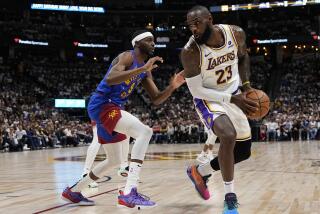‘Nuclear’ Winter Not Yet an Option
- Share via
LAS VEGAS — Give peace a chance?
In an NBA lockout marked by polarization and paranoia on both sides, the union took a small step away from the brink, renouncing decertification as a tactic--for the moment, of course, the lion and the lamb have yet to lie down together--in favor of returning to the bargaining table.
“We don’t think decertification is necessary at this point,” Billy Hunter, director of the National Basketball Players Assn., said Wednesday after meeting with the agents’ advisory committee.
“Not that it won’t become necessary in the future . . . [but] we think the fight is just beginning. While the owners’ intent is to create pain and anxiety among our membership, the reality is they’re going to feel some of that pain and anxiety themselves. If they have to cancel games, they have to look introspectively and decide how much are they prepared to suffer.”
Decertification, which would precede filing an antitrust suit, is the so-called “nuclear” option, which would abandon the bargaining process in favor of a three-to- five-year court battle, which could blow up the union or the season or the existing NBA order.
Most of the agents here are veterans of an unsuccessful decertification drive in 1995. With emotions running high after the union lost its arbitration case this week, there were calls on an agents’ conference call Monday for an encore.
However, sources say this time around, there were only three agents baying for decertification-- Mark Fleischer, Mark Bartelstein and Don Fagan--and none of the biggies with the glamour stables like David Falk and Arn Tellem.
Falk’s client list includes the union president (Patrick Ewing), two members of the board of directors (Alonzo Mourning, Dikembe Mutombo) plus Michael Jordan, who is expected to make a rare appearance at a union function today.
Three years ago, Falk says, decertification was appropriate but it is less so now.
“I think three years ago, we felt the union was on the wrong track,” Falk said, “and Michael, Patrick and Alonzo took the lead. They had the most to lose, as we all learned later on. They made a combined $60 million. And they put it on the line because they believed they had a legacy that was handed down to them, from [former union presidents] Oscar Robertson and Bob Lanier . . . and that’s what they wanted to turn over to the next generation of players. . . .
“I think it [decertification] is an option, but it’s not a panacea. I think a unified union which we have today--we didn’t have that three years ago. You all know that. It was very divided from the leadership on through.”
Despite a drumbeat of doomsday scenarios in the news this week, sources say decertification was barely discussed Wednesday, with Hunter all but tabling it himself as too dire a remedy too early in the process.
It wasn’t a hard sell. Many agents who fought to decertify in 1995 are cool at present, since it’s a long-term process and, they have been advised by labor lawyers, no slam dunk.
If the union decertifies, it would ask a court to order the league to lift the lockout. The NBA would argue that decertification is a sham, noting union counsel Jeffrey Kessler also represented NFL players in a decertification. In the NFL case, the union decertified, filed antitrust charges, went to court, won--and immediately formed again.
Even if NBA players persuaded the judge to lift the lockout, the antitrust case would take years and could require $10 million in legal fees.
Even if the players prevailed ultimately, and a judge struck down the salary cap and the draft, they still would have to sit down with the NBA and work out a new agreement, as the football players did with the NFL.
After their victory, the football players agreed to a deal with the NFL that is more restrictive than the present NBA contract, featuring the dread “hard cap” that basketball players have pledged never to accept.
The basketball players won’t be going there, for a while, anyway. Instead, Hunter signaled his intention to start talking again, communication having been the missing element in this process, with only four bargaining sessions since July 1.
What will it take to restart talks?
“It doesn’t take anything but a call,” Hunter said. “As soon as we get out of Las Vegas, I’ll call them.”
Their meeting ends today. It wasn’t an outbreak of peace, but it wasn’t more of the same, either.
More to Read
Go beyond the scoreboard
Get the latest on L.A.'s teams in the daily Sports Report newsletter.
You may occasionally receive promotional content from the Los Angeles Times.










